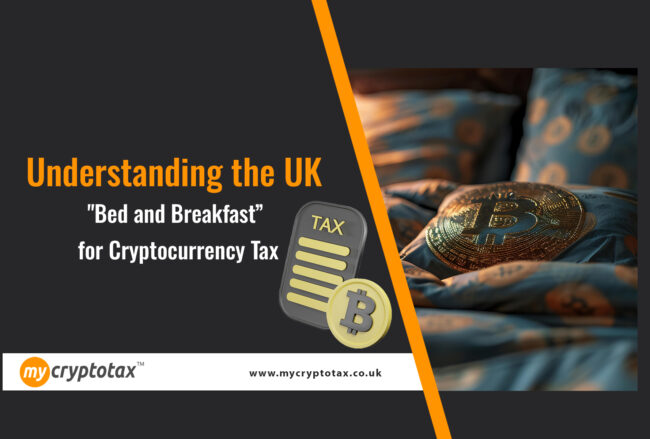Understanding the UK “Bed and Breakfast” for Cryptocurrency Tax

The UK Bed and Breakfast rule is a key tax rule that crypto investors must understand to avoid surprises when reporting their cryptocurrency capital gains. The rule, originally designed for traditional assets like stocks and securities, also applies to cryptocurrency transactions under the HMRC crypto tax guidelines. In this article, we’ll explain how the Bed and Breakfast rule works, provide a worked example, and explore how savvy investors can use it for tax planning.
What is the Bed and Breakfast Rule?
The Bed and Breakfast rule, detailed in Section 106A of the Taxation of Chargeable Gains Act 1992 (TCGA 1992), prevents investors from selling and repurchasing the same asset (including cryptocurrency) within 30 days to artificially realize capital gains or losses. If you sell a crypto asset like Bitcoin (BTC) and repurchase it within the 30-day window, HMRC will match the sale and repurchase prices, limiting your ability to claim tax benefits from the transaction.
![[Tags] bitcoin-business-as-part-economy-1-e1726863975386-1024x575 Understanding the UK "Bed and Breakfast” for Cryptocurrency Tax](http://mycryptotax.co.uk/wp-content/uploads/2024/09/bitcoin-business-as-part-economy-1-e1726863975386-1024x575.jpg)
How the Bed and Breakfast Rule Applies to Cryptocurrency
Let’s look at a simple scenario to see how this works.
Worked Example
Day 1: You sell 3 BTC at £8,000 each for £24,000. These Bitcoin were originally purchased for £10,000 each, costing you £30,000.
Expected capital loss: £6,000.
Day 10: You repurchase 3 BTC at £7,500 each for £22,500.
Because you’ve repurchased Bitcoin within 30 days, HMRC applies the Bed and Breakfast rule. The sale is matched with the new purchase price (£7,500), not the original purchase price. So, instead of realizing a £6,000 loss, your new capital loss will be just £1,500.
Tax Planning Strategies Around the Bed and Breakfast Rule
![[Tags] bitcoin-business-as-part-economy-1-e1726863975386-1024x575 Understanding the UK "Bed and Breakfast” for Cryptocurrency Tax](http://mycryptotax.co.uk/wp-content/uploads/2024/09/laptop-with-book-open-cup-coffee-table-1024x585.jpg)
The cryptocurrency Bed and Breakfast rule restricts the immediate harvesting of losses for tax purposes, but it doesn’t eliminate strategic options for managing your crypto tax liability. Here are some ideas to navigate this rule while keeping your tax position efficient.
1. Delay Repurchasing the Same Cryptocurrency
To avoid the rule, consider waiting more than 30 days before repurchasing the same cryptocurrency. By doing so, you’ll ensure the sale fully realizes the gain or loss for capital gains tax purposes. However, the downside is that the market could move against you during that waiting period.
2. Invest in a Different Cryptocurrency
Another way to maintain exposure to the crypto market without triggering the rule is by purchasing a different asset. For example, if you sell BTC, consider buying Ethereum (ETH) or another digital asset to avoid the rule. This still allows you to benefit from the tax gain or loss on the sale.
3. Use Spousal Transfers
Transfers between spouses are tax-free under Section 58 of the TCGA 1992. You can transfer cryptocurrency to your spouse, who can then sell or repurchase the assets, allowing for more flexibility in managing your tax liability.
4. Utilize the Annual Capital Gains Allowance
Each year, UK taxpayers can claim a tax-free capital gains allowance. For the 2023/24 tax year, this allowance is £6,000. By carefully timing your disposals to keep your gains below this threshold, you can reduce your crypto tax liability without triggering CGT.
Final Thoughts
For UK cryptocurrency investors, the Bed and Breakfast rule is an important factor to consider when planning tax-efficient trades. While it limits immediate tax loss harvesting, with careful planning, you can minimize its impact. Strategies such as delaying repurchase, using different assets, and leveraging spousal transfers can help you stay compliant with HMRC crypto tax rules while optimizing your tax position.
Remember, tax laws around cryptocurrency are evolving, and it’s essential to stay informed about how the rules might change. If you’re unsure how to navigate these regulations or want to ensure you’re taking advantage of all available tax-saving opportunities, consult a tax advisor who specializes in cryptocurrency.
Here are three FAQs related to the Section 106A Bed and Breakfast rule for cryptocurrency tax in the UK:
![[Tags] bitcoin-business-as-part-economy-1-e1726863975386-1024x575 Understanding the UK "Bed and Breakfast” for Cryptocurrency Tax](http://mycryptotax.co.uk/wp-content/uploads/2023/12/1-edited.png)
DISCLAIMER
© My Accountancy Team 2024 All Rights Reserved – The above articles are provided for guidance only and may not cover your personal circumstances so you should not rely on them. It is important that you seek appropriate professional advice which takes into account your personal circumstances where you can provide the full facts of the case and all documents related to your case. My Accountancy Team Ltd t/a mycryptotax.co.uk, cannot be held responsible for the consequences of any action or the consequences of deciding not to act.
![[Tags] bitcoin-business-as-part-economy-1-e1726863975386-1024x575 Understanding the UK "Bed and Breakfast” for Cryptocurrency Tax](http://mycryptotax.co.uk/wp-content/uploads/2023/12/2-1-1024x390.jpg)
Do you have a question for our experts?
If there’s cryptocurrency tax issue that has you puzzled or worried, get in touch. Everyone on our team loves to talk, especially when it helps people like you find peace of mind.
Schedule a free consultation with one of our Crypto Tax Experts and get your questions answered fast!
